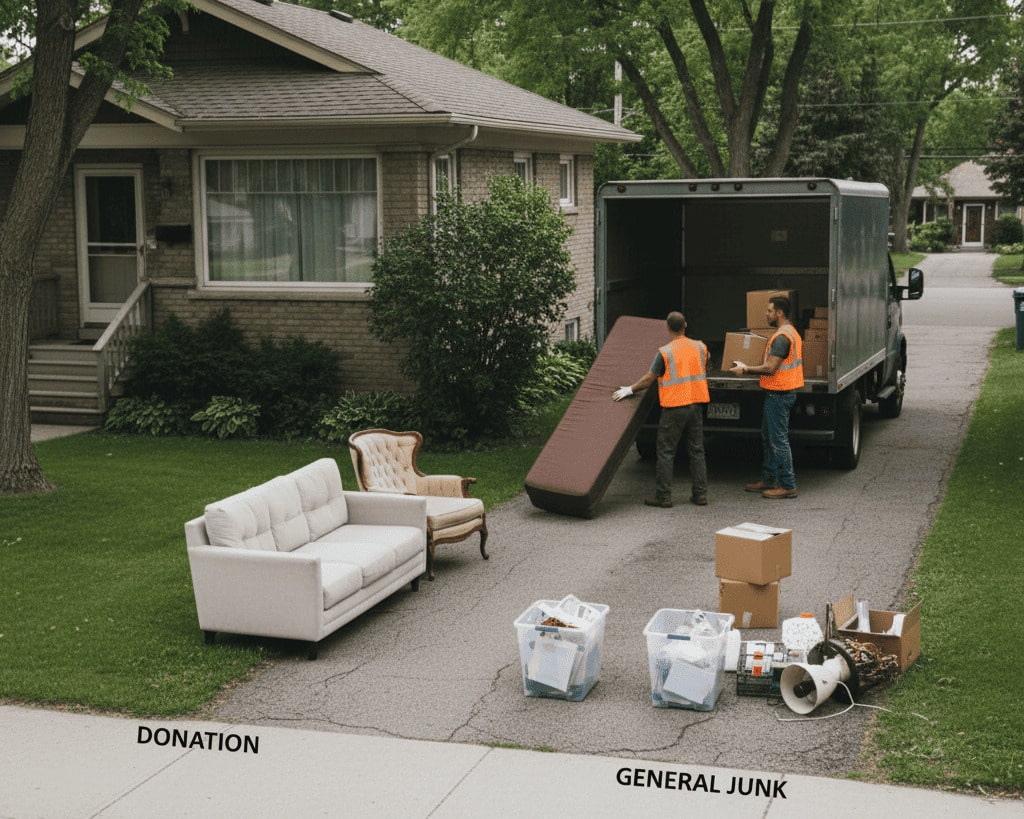Planning a renovation, deck removal, basement cleanout, or major landscaping job in western Winnipeg? Renting a roll off dumpster Western Winnipeg makes debris removal simpler when you pick the right size, plan truck access, and route problem materials correctly. This guide walks you through everything homeowners need to know: where to find local providers, how deliveries and permits work, what you can and cannot load, recycling options with Winnipeg’s 4R depots, and practical tips to avoid common delivery-day problems. I’ll also show how Mr. Garbage can help at each step, from photo-based site checks to depot routing and permit support.
What is a roll off dumpster Western Winnipeg, and why use one?
A roll-off dumpster Western Winnipeg is a large, open-top container dropped and picked up by a roll-off truck. It’s ideal for projects that generate bulky or heavy volumes of waste that won’t fit into standard curbside carts, such as cabinetry, drywall, flooring, furniture, roofing debris, and garden waste.
Why homeowners choose roll-off dumpsters:
- They reduce trips to transfer stations and keep work sites tidy.
- They allow contractors and households to load steadily over a few days or weeks.
- Local haulers can arrange permits, recommend sizes, and route recyclable streams properly. Mr. Garbage
If you’re searching “dumpster roll off near me western winnipeg,” prioritize local providers; they know neighbourhood access limits, City permitting rules, and depot routing.
Where to find a roll-off dumpster in Western Winnipeg
Start with local haulers and aggregation sites, but vet them for Winnipeg experience.
- Local companies (including Mr. Garbage) list available roll-off sizes and delivery policies on their Winnipeg pages and typically support street permits when needed. Mr. Garbage
- Aggregator sites and local review groups can reveal delivery speed and reliability, but confirm that the provider actually services western Winnipeg.
- Ask contractors or neighbours for recommendations; experienced local crews usually know which haulers handle tight laneways and tricky driveway turns.
Choosing a provider who frequently works in your area reduces the chance of misdelivery or permit issues.
Common sizes and what they hold
Roll-off containers come in several sizes; many homeowners find mid-size units hit the balance between capacity and residential fit. A commonly requested size for home projects is the 30-yard roll-off, but smaller or larger containers are also used depending on the job.
What size do I need?
- For whole-room renovations or major cleanouts, the 30-yard option is often recommended.
- For smaller cleanups or tight access, shorter or “walk-in” style containers are available (and sometimes easier for contractors).
- Confirm dimensions with the hauler and measure your driveway or drop zone before booking; some trucks need straight backing room to set the container. republicservices.com
A quick photo of the driveway sent to the hauler can save time; many companies will confirm truck suitability from a few images.
Delivery logistics and truck access
Successful deliveries are predictable because of good planning.
Truck approach checklist
- Measure driveway length and width; note any tight turns.
- Check overhead clearance for tree branches, power lines, or eaves.
- Confirm the surface is strong enough; soft lawns, new pavers, or delicate driveways may need protective boards or mats under the container.
- Remove parked cars and obstacles from the approach on delivery day. Mr. Garbage
Photo-based confirmations are standard practice; send images when booking and ask if the hauler offers driveway-protection options.
Permits, street placement, and City rules in Winnipeg
If the dumpster must sit partly or fully on public property, sidewalk, boulevard, or street, you’ll usually need a City permit.
When you need a permit
- Driveway placements on private property typically do not require a City Use of Street permit.
- If any portion of the container will be on public land (including part of the street or boulevard), a Use of Street or related permit is generally required. The City’s Public Works permits page explains the application process and contacts. City of Winnipeg
Many local haulers, including Mr. Garbage, will arrange the permit on your behalf if curbside placement is necessary. Ask when you book to avoid surprises. Mr. Garbage
Accepted and prohibited items
Loading the wrong materials is the fastest way to get a bin rejected at the drop-off facility. Know the boundaries.
Commonly accepted materials
- Non-hazardous demolition and construction debris: drywall, lumber, flooring, shingles (subject to local rules), cabinets.
- Household cleanout items: furniture, mattresses, boxes (donate what’s reusable first).
- Yard waste and mixed household debris (confirm with your hauler).
Items that need special handling
- Electronics, batteries, fluorescent bulbs, and household hazardous products (paints, solvents, pesticides) should go to Winnipeg’s 4R depots, not a general roll-off. City of Winnipeg
- Appliances containing refrigerant require certified recovery before pickup.
- Asbestos, contaminated soils, and other regulated hazardous wastes need licensed abatement and specialized disposal and must never be placed in a standard roll-off.
Declare large quantities of heavy materials (concrete, soil, tiles) ahead of time; some sites have strict acceptance and weight rules.
Recycling, diversion, and Winnipeg 4R depots
A roll-off rental can be part of a high-diversion project when you separate streams on site.
Use 4R depots for problem streams.
Winnipeg’s 4R depots accept electronics, batteries, household hazardous materials, certain glass, and other specialty streams that should never be mixed into a roll-off. Planning depot trips for those items reduces contamination and ensures the materials are handled safely. City of Winnipeg
On-site separation tips
- Pull metals, clean wood, and flattened cardboard aside for separate recycling or pickup.
- Bag small recyclables and keep hazardous liquids in clearly labeled containers for depot drop-off.
- Consider donating reusable fixtures and furniture; many charities accept items in good condition.
Canada-wide data shows that residential sources contribute substantially to diverted waste, so household decisions to separate materials do matter at scale. Canada
Common delivery-day problems and how to avoid them
Most issues are preventable with a simple checklist.
Avoid these mistakes
- Failed delivery due to blocked access. Mitigation: clear cars and obstacles, send photos.
- Load rejected for prohibited items. Mitigation: declare electronics, oils, or refrigerant appliances ahead of time and plan depot runs. City of Winnipeg
- Driveway damage. Mitigation: Use plywood or mats under the container and request cautious placement.
- Permit surprises. Mitigation: check whether curb placement needs a Use of Street permit and ask your hauler to arrange it if they offer that service. City of Winnipeg
A good hauler will give you a short pre-delivery checklist, use it, and save time on the actual day.
How Mr. Garbage helps homeowners in western Winnipeg
Working with an experienced local provider minimizes surprises.
Services Mr. Garbage offers in Western Winnipeg
- Photo-based site assessments to confirm truck access and the best drop point. Mr. Garbage
- Arrangement of street permits for curbside placement when required. City of Winnipeg
- Guidance on separating recyclables and routing special streams to Winnipeg’s 4R depots and certified processors. Mr. Garbage
- Staged pickups and clear disposal documentation for homeowner records.
A local waste consultant I spoke with summarized it well: “Choosing a hauler familiar with Winnipeg’s depots and permit rules usually prevents the two or three headaches most homeowners face on delivery day.” (paraphrased field expert)
Real homeowner examples from Western Winnipeg
Whole-kitchen renovation
A homeowner preparing for a kitchen remodel separated cabinetry and appliances from recyclable metals and cardboard. Mr. Garbage delivered a 30-yard roll-off, advised on refrigerator refrigerant recovery, and scheduled pickup after the contractor’s demo day. Recyclable metals were taken separately to processors; hazardous cleaners were dropped at a 4R depot.
Estate cleanout and donation-first approach
Another family used a roll-off for the remaining junk after donating usable furniture. They bagged small recyclables and took electronics to a 4R depot. The single roll-off kept the property accessible to movers and contractors and simplified the cleanout timeline.
Deck removal and yard overhaul
The homeowner declared treated wood and soil in advance. Mr. Garbage advised which materials could go into the roll-off and which required separate handling. Staged pickups were used to avoid driveway blockage during the project.
These examples show how small planning choices (donation, pre-sorting, depot trips) reduce landfill tonnage and avoid operational problems.
Safety, insurance, and record-keeping
Documentation matters.
- Keep delivery and disposal receipts; they’re useful for insurance claims and property resale disclosures.
- Use licensed professionals for refrigerant recovery and asbestos abatement; ask for certificates of disposal and recovery.
- Secure loose debris and cover bins if wind or heavy rain is expected to prevent litter on the street.
A little paperwork protects you later.
Is a roll-off dumpster in Western Winnipeg right for you?
- Are you tackling a renovation, major cleanout, or landscaping project? If yes, a roll-off usually fits.
- Can your driveway or approach handle a roll-off truck? Measure and photograph.
- Will any part of the container sit on public property? If yes, plan for a City permit. City of Winnipeg
- Do you have electronics, paints, or appliances? Plan depot trips or professional recoveries for these items.
- Want help? Local haulers like Mr. Garbage can confirm placement and routing from photos and arrange permits when needed. Mr. Garbage
Conclusion
A roll-off dumpster in Western Winnipeg simplifies large home projects when you choose the right size, plan for truck access, route hazardous or special materials to Winnipeg’s 4R depots, and work with a local hauler who understands City permits and neighbourhood quirks. Mr. Garbage supports homeowners across Winnipeg with photo-based site checks, permit coordination, depot routing, and staged pickups to keep projects smooth and compliant.
If you’re ready to simplify cleanup for your western Winnipeg project, contact Mr. Garbage for a site assessment and a delivery plan tailored to your property and timeline.
Frequently Asked Questions (FAQs)
Q1: What size roll-off is best for a home renovation in western Winnipeg?
A1: Many homeowners choose a 30-yard roll-off for multi-room renovations or large cleanouts; smaller or taller walk-in units can work for tight-access jobs. Measure your driveway and send the hauler photos so they can advise the best size.
Q2: Do I need a permit to place a roll-off dumpster on my street in western Winnipeg?
A2: If any part of the dumpster will be on public property (boulevard, sidewalk, or road), you typically need a City Use of Street permit. Ask your hauler whether they arrange permits when booking.
Q3: Can I put electronics and paint in the roll-off?
A3: No. Electronics, batteries, paint, fluorescent bulbs, and many household hazardous items should be taken to Winnipeg’s 4R depots for safe processing. Don’t mix them into a general roll-off load.
Q4: How do I prepare my driveway for delivery?
A4: Clear vehicles and obstacles, check overhead clearance, protect soft surfaces with plywood if necessary, and send photos of the approach to your hauler so they can confirm truck access.
Q5: How can Mr. Garbage help with my roll-off rental in western Winnipeg?
A5: Mr. Garbage offers site assessments from photos, helps arrange permits for street placements, advises on separating recyclables, and routes special items to 4R depots and certified processors.

